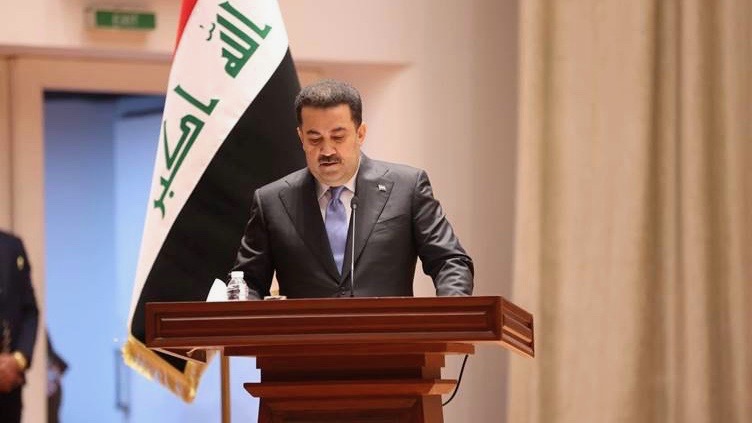In recent news, Iraq’s Prime Minister has announced the government’s decision to close down the mission of the US-led coalition permanently. This move comes after years of joint operations between Iraq and the coalition forces to combat terrorism and stabilize the region. The decision has significant implications, not only for Iraq but also for the broader geopolitical dynamics in the Middle East.
Assessing the Reasons behind the Decision
The decision to end the presence of the US-led coalition forces in Iraq permanently raises questions about the country’s future direction and its relationship with the United States. While the exact reasons behind this move may vary, it is crucial to analyze the factors contributing to this decision.
One key factor is Iraq’s growing desire for full sovereignty and independence. Over the years, Iraq has made significant progress in rebuilding its institutions and security forces. As a result, the Iraqi government may feel confident in its ability to maintain stability and security without the continued presence of foreign forces.

Geopolitical Implications of the Decision
The decision to close down the US-led coalition’s mission in Iraq permanently carries profound geopolitical implications. It reflects a shifting balance of power in the region and highlights Iraq’s desire to assert its autonomy in shaping its own destiny.
- Impact on US-Iraq Relations: The decision may strain the relationship between Iraq and the United States. While the two countries have cooperated closely in the fight against terrorism, the withdrawal of coalition forces could lead to a reevaluation of their bilateral ties.
- Influence of Regional Powers: The closure of the US-led coalition’s mission in Iraq could create opportunities for regional powers to exert their influence. Countries like Iran, Saudi Arabia, and Turkey may seek to fill the vacuum left by the coalition forces, further shaping the regional power dynamics.
- Security Challenges: The withdrawal of coalition forces could potentially lead to security challenges within Iraq. Without the support and presence of international forces, Iraq’s security forces will need to ensure they can effectively maintain stability and combat any resurgence of terrorist groups.
The Future of Iraq’s Security Landscape
With the permanent closure of the US-led coalition’s mission, Iraq will face new challenges in maintaining security and stability. The country’s security forces will need to step up efforts to ensure the safety of its citizens and protect against any potential threats. Read Death Toll in Gaza

- Strengthening Internal Security: Iraq will need to invest in the training and capacity-building of its security forces to maintain stability and counter any security threats independently.
- Regional Cooperation: Iraq may seek to enhance regional cooperation to address common security challenges. Collaborative efforts with neighboring countries and regional organizations can contribute to a more stable and secure Iraq.
- Counterterrorism Measures: Iraq’s fight against terrorism will continue even without the presence of the coalition forces. The country will need to develop robust counterterrorism strategies and engage in intelligence-sharing with international partners to effectively combat extremist groups.
The decision by Iraq’s government to permanently close down the US-led coalition’s mission marks a significant turning point in the country’s relationship with foreign forces and its pursuit of full sovereignty. While this decision carries geopolitical implications and potential security challenges, it also presents an opportunity for Iraq to assert its autonomy and shape its future independently.
As Iraq prepares to take on the responsibility of maintaining security and stability within its borders, it will need to strengthen its internal security apparatus through investment in training and capacity-building for its security forces. Additionally, regional cooperation will play a crucial role in addressing common security challenges, and Iraq may seek to enhance collaboration with neighboring countries and regional organizations.
The fight against terrorism will continue to be a priority for Iraq, even without the presence of the coalition forces. The country will need to develop robust counterterrorism strategies and engage in intelligence-sharing with international partners to effectively combat extremist groups.
In the broader geopolitical context, the closure of the US-led coalition’s mission in Iraq could lead to a reevaluation of the relationship between Iraq and the United States. It may also create opportunities for regional powers to exert their influence, potentially shifting the power dynamics in the Middle East.
Overall, the decision to end the presence of the US-led coalition forces in Iraq permanently reflects Iraq’s growing desire for full sovereignty and independence. While challenges lie ahead, Iraq has the opportunity to assert its autonomy and shape its future in a manner that aligns with its national interests and aspirations.
Subscribe to Our Newsletter for Exclusive Updates and Insights
By subscribing, you’ll gain access to a treasure trove of valuable content delivered straight to your inbox. Stay ahead of the curve with expert articles, insider tips, and thought-provoking resources carefully curated by our team of professionals. Whether you’re a seasoned enthusiast or just getting started, our newsletter is a must-have resource for staying informed and inspired.
